In this article:
Kale is a popular leafy green vegetable that belongs to the Brassica oleracea family. The leaves can be green or purple and have either a smooth or curly shape. It looks beautiful and has an earthy flavor.
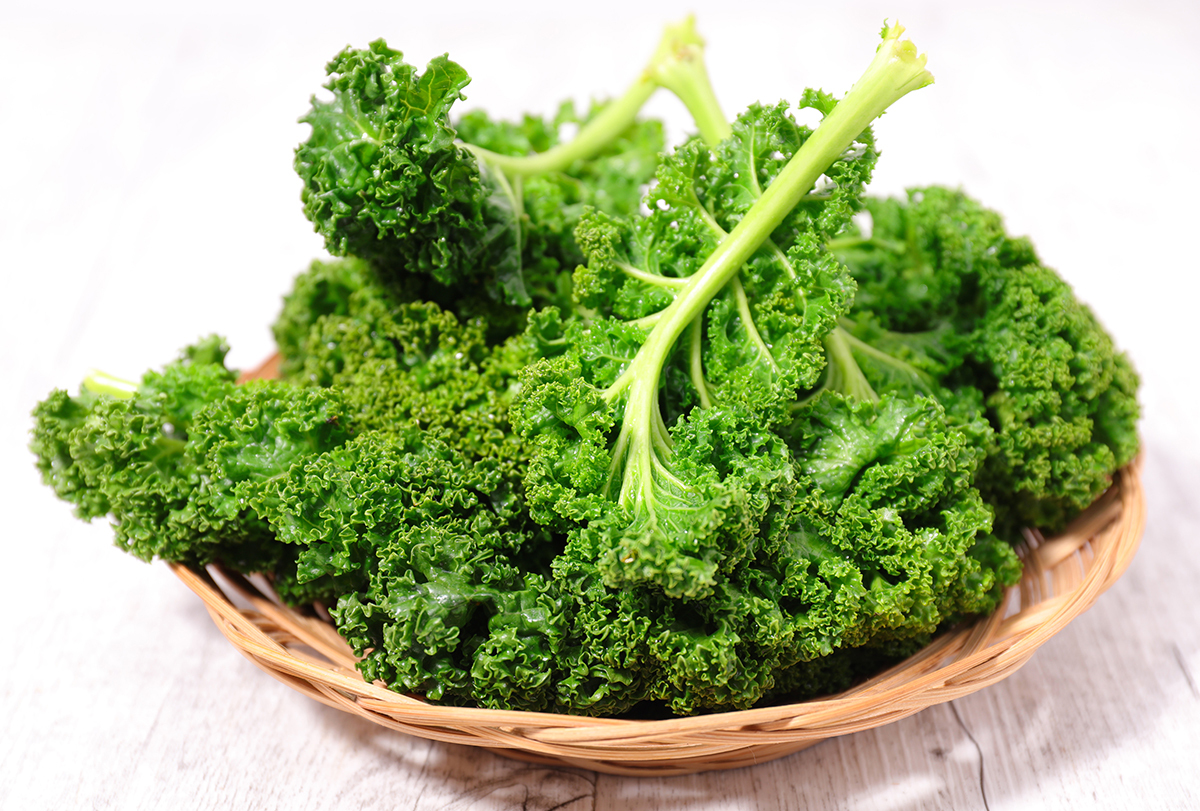
Although available year-round, it is in season from the middle of winter through the beginning of spring. During this time, kale has a sweeter taste and is more widely available.
Reasons Why Kale Is Good for Your Health
Here are 10 health benefits of kale.
1. Boosts heart health
Kale can help protect against heart disease. It contains antioxidants that help your body fight free radicals that damage cells and genetic material. In addition, its magnesium and potassium content helps keep the blood pressure level normal. (1)
A high potassium intake is also associated with a reduced risk of strokes. (2)
Moreover, kale contains substances that bind bile acids to lower low-density lipoprotein (LDL or “bad” cholesterol) and increase high-density lipoprotein (HDL or “good” cholesterol) levels in the body. This helps improve heart health over time. (3)
Drink kale blended with 1 teaspoon of powdered flaxseeds or chia seeds a few times a week to improve your cardiovascular health.
2. Prevents anemia
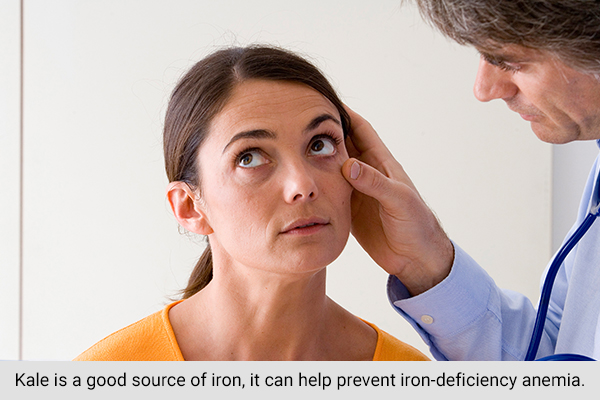
Low levels of red blood cells lead to anemia, which causes fatigue. To make red blood cells and increase hemoglobin levels, your body needs iron.
As kale is a good source of iron, it can help prevent iron deficiency anemia. It also contains vitamin C which helps improve the body’s absorption of iron. (4)
In addition, kale is rich in vitamin B12 and folic acid, which are energy-boosting nutrients that the body needs to prevent anemia.
3. Improves bone health
Kale contains a good amount of calcium and vitamin K, along with magnesium and omega-3 fatty acids. All these nutrients are essential for bone health.
In particular, vitamin K plays an important role in preventing osteoporosis. Moreover, vitamin K helps retain calcium in the bone matrix. A deficiency of vitamin K puts you at a higher risk of bone fractures. (5)
Eat this vegetable in grilled, steamed, or raw form. It makes a good addition to salads, sandwiches, appetizers, and soups.
4. Reduces inflammation
Inflammation in the body can be the cause and the symptom of many health problems, including arthritis, autoimmune disorders, and asthma. Kale contains omega-3 fatty acids, especially ALA, that works as a potent anti-inflammatory agent to reduce pain and inflammation. (6)
In addition, kale contains carotenoids that work as inflammation-reducing antioxidants, as well as vitamins E and C. These components help protect the body from pro-inflammatory molecules called cytokines.
Consume kale regularly to fight inflammation and pain.
5. Improves eye health
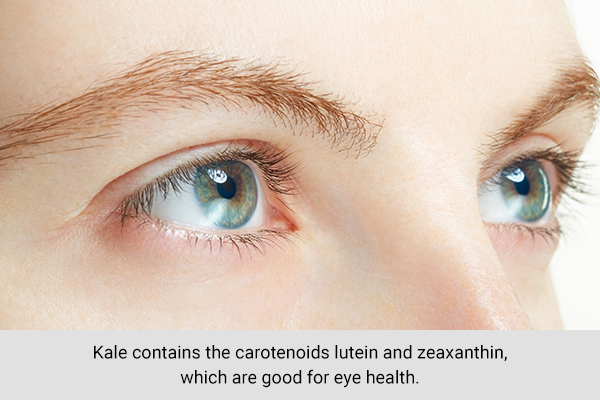
Kale is one of the healthiest foods for your eyes. It is loaded with many carotenoids that the body needs to produce vitamin A. This vitamin helps protect the cornea and prevents degeneration of eye cells to ensure good eyesight for years. (7)
In addition, kale contains the carotenoids lutein and zeaxanthin, which are good for eye health. In fact, they play protective roles against age-related macular degeneration and cataracts. (8)
Moreover, carotenoids assist in preventing damage to the eyes from excessive exposure to the sun’s harmful ultraviolet (UV) rays. (9)
Start taking kale in your diet in juice, salad, or soup form to ensure good eyesight.
6. Helps manage diabetes
Kale contains fiber, which is good for both type 1 and type 2 diabetes. Fiber helps lower blood glucose levels in people suffering from type 1 diabetes. In people who have type 2 diabetes, it helps improve blood sugar, lipids, and insulin levels. (10)
In addition, the omega-3 fatty acids in kale help increase insulin sensitivity and prevent oxidative stress-induced changes in patients with diabetes. (11)
Moreover, the magnesium in kale may help prevent type 2 diabetes, especially when combined with an overall healthy diet. (12) Plus, the American Diabetes Association identifies this nonstarchy vegetable as a low-glycemic-index (GI) food.
7. Aids in weight loss
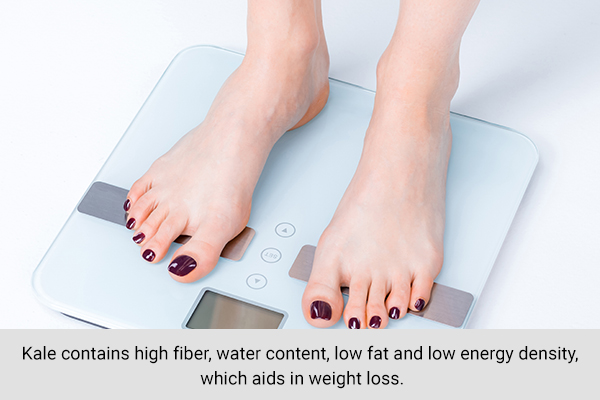
Kale contains several properties that make it perfect for a weight-loss diet. It is low in both calories and carbohydrates but loaded with fiber. Fiber helps keep you feeling full for a longer time, so you will eat less throughout the day. (13)
Also, due to its high fiber and water content and low fat, kale has a low energy density, which aids in weight loss.
Eat kale on a regular basis to increase the volume of your meals without adding too many calories. You can use kale to make a green salad, a glass of vegetable juice, or a bowl of soup.
8. Strengthens the immune system
The impressive range of nutrients and antioxidants in kale strengthen the immune system to fight viruses and bacteria.
The vitamin C in kale helps boost your immune system and regenerate other antioxidants in the body, while vitamin A plays a critical role in energy production in the cells. Kale also contains folate and iron, two important immune-boosting nutrients. (14)
Add this green vegetable to your salads, smoothies, and soups or make kale chips.
9. Helps in detoxification

Kale provides comprehensive support for the body’s detoxification system. It can help support the organs that are naturally responsible for detoxifying the body, such as the liver and kidneys. The fiber and sulfur in kale help the detoxification process. (15)
Fiber promotes a healthier gut that is more effective at preventing unwanted substances from being absorbed by your body and eliminating them as waste products. This, in turn, supports kidney and liver functions. (16)
In addition, the isothiocyanates made from glucosinolates in kale may play a beneficial role in the body’s ability to protect itself from environmental toxins. (17)
To make a detox support smoothie, blend together 1 cup chopped kale, ½ lemon (peeled and seeded), ½ lime (peeled and seeded), 1 banana, ½ tablespoon grated ginger, 1 cup water, and 1 tablespoon raw honey. Start your day with this green smoothie.
10. May fight cancer
Kale contains powerful antioxidants, including carotenoids and flavonoids, that help protect against various cancers such as colon, prostate, and ovarian cancers. (18)
In addition, the sulforaphane compounds in kale are effective at fighting cancer, particularly colon cancer. A 2014 study published in the journal Advances in Nutrition and Cancer found sulforaphane to be a promising molecule for fighting cancer. (19)
The high amount of vitamin K and phytonutrients in kale help prevent free radical damage, a contributing factor to high cancer risk. It also contains a compound known as indole-3-carbinol that helps prevent cancer. (20)
If you already have cancer or you are at a higher risk of developing cancer, include kale in your diet.
Nutritional Content of Kale
Kale has an excellent nutritional profile, putting it high on the list of the world’s healthiest foods. It contains vitamins A, K, C, B6, B1, B2, and B3.
Other nutrients found in kale are manganese, calcium, copper, potassium, magnesium, iron, phosphorus, dietary fiber, and protein.
Nutritional content of kale per 100 grams: (21)
| Nutrient | Quantity | Amount |
|---|---|---|
| Water | g | 89.63 |
| Energy | kcal | 35 |
| Protein | g | 2.92 |
| Total lipid | g | 1.49 |
| Carbohydrate | g | 4.42 |
| Fiber | g | 4.1 |
| Sugars | g | 0.99 |
| Calcium, Ca | mg | 254 |
| Iron, Fe | mg | 1.60 |
| Magnesium, Mg | mg | 33 |
| Phosphorus, P | mg | 55 |
| Sodium, Na | mg | 53 |
| Zinc, Zn | mg | 0.39 |
| Vitamin C | mg | 93.4 |
| Thiamin | mg | 0.113 |
| Riboflavin | mg | 0.347 |
| Niacin | mg | 1.180 |
| Vitamin B-6 | mg | 0.147 |
| Folate | mcg | 62 |
| Vitamin A | mcg | 241 |
Tips for Eating or Cooking Kale
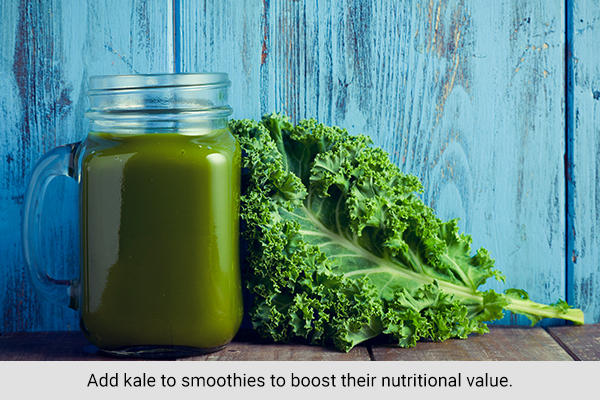
- Eat young, tender kale leaves raw by adding them to your salad.
- Enjoy kale chips for a healthy snack.
- Add kale to smoothies to boost their nutritional value.
- Use kale along with other green vegetables to make a healthy glass of vegetable juice.
- Steaming, microwaving, and stir-frying are the best ways to cook kale. Avoid boiling it, which diminishes its nutritional properties.
- As kale may contain residual pesticides, opt for organic kale or grow it in your own garden.
Risks and Precautions With Kale
- Kale contains a small but measurable amount of oxalates. People with kidney problems, gallbladder problems, gout, or rheumatoid arthritis should consult their doctor before adding kale to their diet.
- People on certain blood-thinning medications should talk with their doctor about consuming kale and other leafy greens.
Final Word
Kale contains very little fat, most of which is the omega-3 fatty acid called alpha-linolenic acid (ALA). Moreover, kale contains antioxidant, anti-inflammatory, anticancer, cardioprotective, antiviral, and antidepressant properties.
Health experts recommend eating about 3 cups of vegetables per day, and adding kale to your diet is a great way to achieve this goal. The suggested serving size is 1½ to 2 cups.
- Was this article helpful?
- YES, THANKS!NOT REALLY


